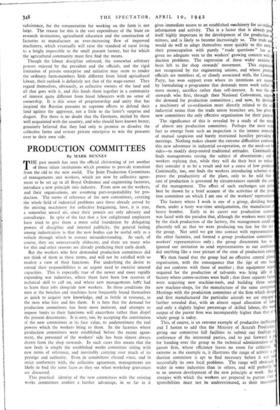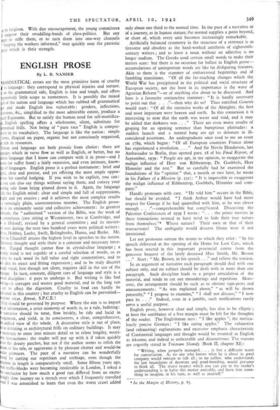PRODUCTION COMMITTEES
By MARK BENNEY
THE past month has seen the official christening of yet another of those infant institutions wh:ch promise to provide transition from the old to the new world. The Joint Production Committees of managements and workers, which are now by collective agree- ment to be set up in all Royal Ordnance and engineering factories, introduce a new principle into industry. From now on the workers, and their organisations, are assuming part-responsibility for pro- duction. The terms of reference of the new committees, covering the whole field of industrial problems save those already served by the existing machinery for collective bargaining, have, it is true, a somewhat unreal air, since their powers are only advisory and consultatiye. In spite of the fact that a few enlightened employers have tried to give them a more solid foundation by delegating powers of discipline and internal publicity, the general feeling among industrialists is that the new bodies can be useful only as a vehicle through which to correct misunderstanding. As such, of course, they are unnecessarily elaborate, and there are many who for this and other reasons are already predicting their early death.
But the workers who first demanded production committees did not think of them in these terms, and will not be satisfied with so modest a view of their functions. For underlying the desire to extend their responsibilities is an urgent need to exercise unused capacities. This is especially true of the newer and more rapidly expanding war industries, where there have been few reserves of technical skill to call on, and where new managements haVe had to learn their jobs alongside new workers. In these conditions the men at the benches and machines have frequently found themselves as quick to acquire new knowledge, and as fertile in resource, as the men who hire and fire them. It is here that the demand for production committees has been most insistent, and attempts to impose limits to their functions will exacerbate rather than dispel the present discontents. It is easy, too, by accepting the constitution of the new committees at its face value, to underestimate the real powers which the workers bring to them. In the factories where production committees were established before the recent agree- ment, the personnel of the workers' side has been almost always drawn from the shop stewards. In such cases this means that the new body is simply the established works committee sitting with new terms of reference, and inevitably carrying over much of its prestige and authority. Even in committees elected since, and in strict- conformity with, the collective agreement, managements are likely to find the same faces as they see when workshop grievances are discussed.
This practical identity of the new committees with the existing works committees confers a further advantage, in so far as it
gives immediate access to an established machinery for co-ordina information and activity. This is a factor that is already p itself highly important in the development of the production mittees, and is likely to become increasingly so. The trade would do well to adapt themselves more quickly to this need, their preoccupation with purely "trade questions" has so given no adequate vent to the workers' growing concern with duction problems. The expression of these wider anxieties been left to the shop stewards' movement. This organuau not recognised by the engineering unions, and whose prom officials are members of, or closely associated with, the Comm Party, has won support even where its intentions are suspe by formulating a programme that demands more work rather more money, sacrifice rather than self-interest. It was the stewards who first, through their National Coavention, expres the demand for production committees ; and now, by develop a machinery of co-ordination more directly related to the a industrial nexus than the trade union branches are, has given new committees the only effective organisation for their p The significance of this is revealed by a study of the mm of almost any production committee. Perhaps the most st fact to emerge from such an inspection is the intense atmosp of mutual suspicion and barely restrained hostility pervading meetings. Nothing makes clearer the extreme difficulties confron this new adventure in industrial co-operation, or the need—on sides—to modify deep-rooted traditional attitudes. Continually finds managements raising the subject of absenteeism ; and workers replying that, while they will do their best to reduce they consider it to be a result and not a cause of low produc Continually, too, one finds the workers introducing schemes to prove the productivity of the plant, only to be told that rate of production is governed by circumstances outside the con of the management. The effect of such exchanges can perh best be shown by a brief account of the activities of the prod tion committee on which I am one of the workers' representatn The factory where I work is one of a group, dividing hem them, under a hasty war-time amalgamation, the manufacture t heavy bomber. Early in its career our production comb was faced with the paradox that, although the workers were apps by the slack production of the factory, the management could ci placently tell us that we were producing too fast for the rest the group. Not until we got into contact with representatives the other factories, and formed a group production committee workers' representatives only ; the group directorate has so ignored our invitation to send representatives to our conferen did anything like a true picture of the state of production emerg We then found that the group had no effective central plan organisation, with the consequence that the jigs" of one fact did not conform with those of another ; that equipment urgen required for the production of tail-units was lying idle in -factory where centre-sections were built ; that three separate fact were acquiring new machine-tools, and building three sep new machine-shops, for the manufacture of the same compon Meetings with the prodUction committee of the firm which desk and first manufactured the particular aircraft we are engaged further revealed that, with an almost equal allocation of la and only a slightly higher percentage of skilled labour, the W output of the parent firm was incomparably higher than that of whole group is today. This, of course, is an extreme example of productive inefficie and I hasten to add that the Ministry of Aircraft Production giving our committee full facilities to submit our findings 10 conference of the interested parties, and to put forward a P for 'handing over the group to the technical administration of parent firm, whose efficiency leaves no room for criticism. extreme as the example is, it illustrates the range of activity a P duction committee is apt to find necessary before it can t2 successfully its own local problems. The range will obviously wider in some industries than in others, and will probably to an uneven development of the new principle at work. But energies with which the workers are prepared to pursue their sponsibilitks must not be underestimated, as their incont
be forgiven. With due encouragement, the young committees -keeping the workers informed," may quickly sour the patriotic pt to stifle them, or to turn them into one-way channels outgrow their swaddling-bands of class-politics. But any THE SPECTATOR, eta* which is their strength.



























 Previous page
Previous page